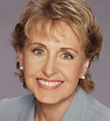Coaching Others to Breakthroughs

You worked in the advertising business before becoming an executive coach. How did that experience help shape your views on coaching?
I started as a copywriter at Leo Burnett; was creative director on the Revlon account at Grey; and created the marketing strategy, name and look that launched Swatch watch. Throughout my career at ad agencies I noticed an interesting difference in the performance of teams. Within the agency where I was working, there were all these agency-client teams. And most were talented, smart and hard-working, but struggled to produce a mediocre result; while another agency-client team, no more talented, smart or hard-working, would produce marketing breakthroughs. What made the difference? I set out to identify the source of performance breakthroughs -- and how to coach others to generate it for themselves.
What was the difference?
The primary difference is what I call the “grip of the past.” Extraordinary teams place no limits on their performance; they are able to go beyond their history and their assumptions of what’s possible. At the same time, ordinary teams are caught in the grip of the past – what’s comfortable, what’s familiar, what’s conventional, what’s consistent with their perceptions and beliefs. They argue for their limitations. They are very reasonable.
Later, as I began to coach, I realized that, as an independent outsider with no allegiance to the past, I could help my clients overcome their self-imposed boundaries by asking the “uncomfortable questions” they wouldn’t ask themselves. Top performers have more at stake and have more expected from them, but their success gives them a stronger “grip of the past” to chip away.
How do you define the role of a coach?
A coach’s role is distinct from the role of a manager, teacher, doctor, therapist, friend or confidant. It is a relationship of equals, for the purpose of causing breakthroughs in the performance of the individual being coached.
I believe everyone wants to enhance his or her effectiveness and results in life, so I believe everyone would benefit from skilled coaching. Look around you. Who would benefit if you were capable of coaching them on some important goal? An employee? Colleague? Client? Spouse? Friend?
What are some basic pointers that you would offer people who want to become effective informal coaches?
Most people waste a lot of time and energy offering advice to people who don’t want it. An individual must be receptive to coaching. If coaching is requested or your offer to give it is genuinely accepted, then you have a basis for coaching.
Next, the coach must relate to the problem as though nothing’s wrong. He or she should listen to the situation, problem or goal that the individual being coached wants to achieve. It’s easy to get drawn into an emotional or dramatic personal saga, with good guys and bad guys. Stay above the fray. Don’t take sides. Your unspoken stand that there’s nothing wrong will provide the calm center necessary for effective coaching.
Hear the story, then ask for the facts. If there’s a lot of emotion around the issue, the person you’re coaching will have difficulty telling you the factual, measurable aspects of the situation. You serve the person by helping to separate fact from interpretation.
How do you accomplish that?
Speak in questions. Coaching is a creative conversation that leads to discovery. Coaching is not your good advice. It’s not about you sharing your experience or solving problems for someone else. It’s about asking questions -- even uncomfortable questions -- that open up an inquiry that leads to breakthroughs. Your answers shut things down.
It’s also important to remember that, no matter how horrific the story, the person you’re coaching is not a victim. Watch for people who blame everyone else for their situation -- clients, management, an assistant, the team, the economy. The route to a breakthrough is by interacting with people as if they are 100% responsible for their experience of their life. If you can’t do this, don’t coach them.
Any final advice for prospective informal coaches?
Once the person you’re coaching sees the situation in a new way or creates a new possibility for himself in the face of a difficult situation, then move the conversation to action. Coaching is about performance and results, so there needs to be action. Ask what actions your colleague promises to take, and by when. Both of you write this down. Ask him to inform you whether he keeps his promise, or not, and what results are achieved.
Above all, remember that no coaching relationship can succeed unless there’s integrity from both parties. Integrity includes all aspects of keeping your word to each other -- from confidentiality, to being on time, to doing the promised actions. The minute the integrity is broken, the relationship becomes ordinary and extraordinary results are out of reach.
Like top performers on the playing field or concert stage, growing numbers of business executives today receive coaching. What was formerly viewed as a resource used principally in remedial situations has become something of a perquisite for high-potential candidates as leading businesses everywhere look to accelerate executives’ development up the corporate ladder. Trisha D. Scudder, a member of WJM Associates’ executive and organizational development faculty, has helped nearly 200 C-level executives become extraordinary leaders, motivating managers and more creative thinkers. She also believes that many business executives can be effective informal coaches to their friends, colleagues and subordinates.
Join our newsletter
Stay up to date on all things happening at WJM Associates



